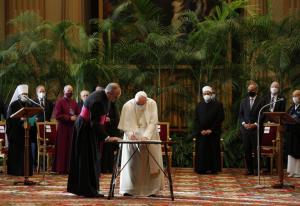
Church-state separation is honored in political rhetoric and welcomed by the Church since the 1930’s. (See my series on Catholic Modern, especially here.) But it has always been a relative thing. States don’t allow just any kind of religious activity, and the Church does cross the line from moral education to politics, including and taking sides for or against a political party. Sometimes the latter is necessary, as in Chile during the oppressive Pinochet dictatorship. (See this post.)
The American Church crosses the line into politics on the issue of abortion, and this post wonders about that. It also wonders how the Church should act on another important issue: the environment.
Politics and abortion
Church leaders claim they are speaking out on moral issues and not engaging in partisan politics. Sometimes that’s not true. Sometimes, as bold actions by the Chilean bishops showed, it shouldn’t be true.
In present-day U.S. church-state relations, partisanship by the Church is more subtle than bold. Our bishops speak out on a wide variety of issues, but much more loudly on some than on others. This amounts to partisanship because of the way the two major parties come down on the issues. The bishops are most vocal and effective on issues that favor Republicans, for example, abortion. Issues on which Democrats are stronger, like the environment, are also of concern to the Church. On these the bishops have spoken cogently, convincingly, and in a whisper, comparatively.
There are weeks for life and religious freedom, but U.S. bishops have announced no days for protecting the earth. (The Pope has proclaimed one, and other bishops’ conferences have a month.) There are pro-life rallies, but no Catholic rallies for laws on global warming, water crises, or endangered species. Global warming, water availability, and species extinction are three grave threats to human life that Pope Francis identified in Laudato Si.
Intrinsic evils
Catholics justify the huge difference in response to abortion and environmental issues by the concept of intrinsic evil. Certain actions are evil no matter what the circumstances. Abortion would be on that list, but actions that contribute to global warming, like driving a car, would not. So abortion becomes, for many Catholics the non-negotiable issue. It overrides every other consideration.
But there are other intrinsic evils, and we can’t refuse to negotiate on all of them. Pope John Paul II lists the following:
… homicide, genocide, abortion, euthanasia and voluntary suicide; whatever violates the integrity of the human person, such as mutilation, physical and mental torture and attempts to coerce the spirit; [things that are] offensive to human dignity, such as subhuman living conditions, arbitrary imprisonment, deportation, slavery, prostitution and trafficking in women and children; degrading conditions of work which treat labourers as mere instruments of profit, and not as free responsible persons…. (Veritatis Splendor, 80)
Surely today one would want to add global warming and other environmental issues to that list.
Abortion and excommunication
There’s a reason the Church is so concerned about the unborn child. There’s a reason the Church has considered abortion to be a much more serious sin than even murder. That reason needs critical examination.
Abortion deprives the unborn child of the possibility of Baptism. She will not grow up to make her own decision for God, however clearly or vaguely she understands God. Traditional theological opinion held that an aborted child could not go to heaven. She would spend eternity in Limbo, a place of natural happiness without the blessed vision and experience of God. As I understand it, that double tragedy – deprivation of life on earth and life with God in heaven — is why the Church has applied the stricture of excommunication to the one procuring or directly participating in an abortion.
The Church no longer considers Limbo a part of revealed teaching. The unborn child is in the hands of the loving God from the first moment of her existence. She has done nothing to put herself outside that embrace. She may be deprived of life, but no one can take heaven away from her. It seems to me that reduces the seriousness of abortion to about that of murder or, let’s say, unjust acts of war. Very serious, but not so serious as to override every other consideration.
Communion and politics
Illinois is among a number of states that recently enacted laws removing nearly all restrictions on abortion. Two prominent Catholic legislators from the Springfield Diocese were instrumental in pushing the bill. Bishop Thomas Paprocki has barred them from receiving Communion. There is some disagreement on the wisdom of the bishop’s action. Few bishops have taken that step. I would like to raise the question, Is the bishop using Communion as an instrument in partisan politics?
It depends on whether the bishop devotes the greatest powers of his office for this one issue only. Or would he bar from Communion another politician from his diocese who sponsored anti-environment legislation? Would this bishop have barred the President from Communion if he were Catholic? For taking the United States out of the Paris Climate Agreement, for example? If not, and given the clear (though whispered, as I said) teaching of the Church on the environment, then the bishop’s action smacks of Republican partisanship.
The Church in politics
The 20th century saw an evolution in the Church’s relationship with the political world. It began with the Church’s recognition that the state has authority in its particular sphere. The Church’s authority, in other words, has limits. There was a mutual recognition that the private sphere belongs to the Church and the public sphere to the state.
My posts on the Church in Chile during the repressive Pinochet regime showed this distinction breaking down somewhat. (See this post.) Chile’s bishops learned that the Church is a public body as much as the state. She is not just an institution concerned about her members’ private consciences. The Church exists primarily in those flesh-and-blood members. She would not be Church at all if she did not defend her members against the state. The bishops were not taking a political side. The regime had effectively banned politics.
Another series of posts looked at the way the Church defined the realm in which to exercise her authority. (See here.) That realm was the family, though family turned out to have different meanings for different groups. Since the 1930’s the Church has been politically active in promoting family values. At least initially those values concerned welfare and the family wage as well as abortion and pornography. It was fairly bipartisan by today’s standards.
Why not just Catholics’ consciences?
When Pope Francis wrote Laudato Si, he addressed the world, not just Catholics. The same is true of all the great social encyclicals. The Church doesn’t just help Catholics form their consciences. She appeals to the whole public in a variety of ways. She engages in traditional lobbying as in Minnesota’s “Catholics at the Capitol.” Catholic Climate Covenant, sponsored by the U.S. bishops, educates but also advocates via letter writing campaigns and public witness. The pope talks to world political and business leaders. What justifies such invasions by the Church into political matters?
It’s not enough to say the Church is society’s moral guardian, as if she has clearer moral vision than anybody else. That’s not necessarily true, even. But the Church does have its vision, and it’s a very long-range one. Along with Judaism, the Church has the longest tradition of any institution on earth. It’s only a common misinterpretation that sees in that tradition primarily a concern about heaven and hell. From its beginning with the Jews and continuing with Jesus that tradition has been about the future reign of God on earth. When the Church is faithful to that tradition, she is uniquely able to see beyond bottom lines and election cycles. Granted, she is not always faithful. But the world has good reason to listen to her vision of a people on the way to a place not yet imagined.
Christian politics
The Church is an actor, among other actors, on the political stage because she is that people on the way. If the issue is abortion, it’s not just about unborn babies. It’s about the kind of people we must be. We can’t be a people that welcomes God’s future and not welcome the most clear sign of that future—the newly created child. This reasoning stands even if one doesn’t imagine God at the climax of that future.
When the issue is the environment, it’s about the only home this people has or ever will have. (Again, it’s a misinterpretation of the Bible to imagine flying away to some other home.) That makes the environment a family matter for the Church. We can’t be silent about it and remain the Family of God.
That thought circles back to the issue of partisanship, with which this post started. The U.S. Church today is relatively silent on environmental and other Democratic issues. In comparison, she fairly shouts on Republican issues, principally abortion. The problem is not partisanship in itself. It’s possible to imagine a situation in which the Church should be partisan. The problem is the U.S. Church, on the whole, is only selectively faithful to our tradition.
By God’s grace we have in Pope Francis a leader who tries to be faithful to the entire tradition. The U.S. bishops should listen to their pope.
Image credit: Earth.com via Google Images












